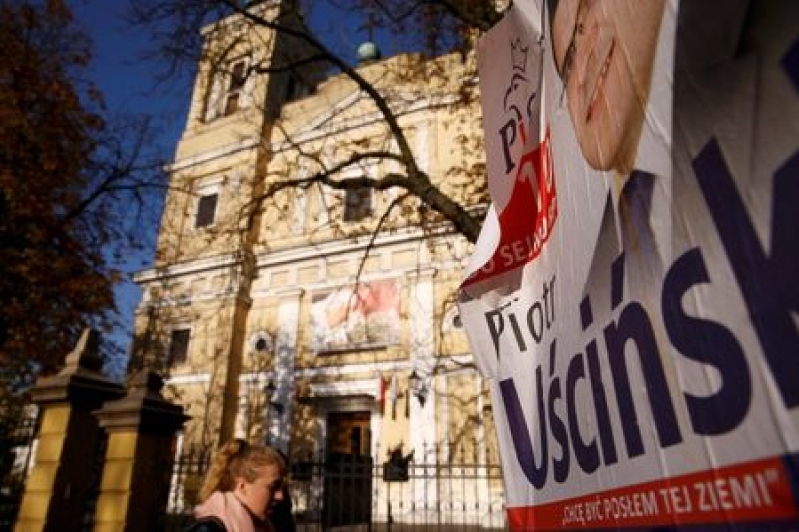
Church attendance may be falling in Poland as elsewhere across Europe, but the victory of conservative opposition Law and Justice (PiS) party in Sunday's election will likely advance the role of Roman Catholic values in public life and government.
Poland remains one of Europe's most Catholic nations, with about 90 percent of citizens declaring allegiance to the church. Yet the clergy's sway over the heart and soul of policymakers and regular churchgoers had been waning.
That may change when the staunchly Eurosceptic PiS, with a brand of patriotism infused with Catholic piety, takes over from the more secular-minded liberal Civic Platform which led the country for the last eight years.
"In Poland, there is no value system that could realistically compete ... with the teachings of the church," PiS leader Jaroslaw Kaczynski said days before the election in an interview for Catholic broadcaster TV Trwam.
"If someone fights this system, then regardless of whether they are a believer or nor, they favor nihilism," said Kaczynski, twin brother of Poland's late president Lech and a regular churchgoer.
At stake could be already restrictive abortion laws - some PiS lawmakers including the party's PM candidate Beata Szydlo have in the past pushed to ban the procedure entirely.
The outgoing centrists rattled the church hierarchy by passing laws regulating access to in vitro fertilization (IVF), prompting bishops to say lawmakers who voted for the new rules could be denied communion.
Some prelates went as far as to say the procedure was a "time bomb" because it introduced unpredictable genetic changes in children.
"You prepared a murderous law, because children are frozen, stopped in their development, waiting in ice-cold conditions until someone decides whether they live or not," Archbishop Andrzej Dziega said in a sermon in July, addressing lawmakers.
IVF was a hot-button issue in the election campaign, with PiS candidates voicing strong opposition.
Preliminary results showed PiS secured 37.6 percent of the vote, with the ruling Civic Platform (PO) coming in second with 24.1 percent, underscoring a broader shift towards social conservative values in Poland.
CHURCH ROLE
Poland's ties with Catholicism are rooted deep in history, but were given a fresh intensity by Karol Wojtyla, a clergyman in the city of Krakow before he became Pope John Paul II.
He helped inspire anti-communist dissent, urging followers not to be afraid. The church often harbored dissidents and helped the Solidarity free trade union organize.
Despite John Paul's role in the collapse of communism in 1989, the church's sway over society weakened with the onset of economic reforms that bred a more materialistic and less spiritual mood. But its values are still very much present.
Forty percent of Poles attend mass regularly, down from more than 50 at the height of anti-communist dissent in the 1980s.
Children attend state-funded religion classes in public schools and are offered little sex education. A crucifix hangs in the Polish parliament, and doctors may refuse to conduct medical procedures if they contravene their beliefs.
Although current Pope Francis has urged Catholics to open their homes to refugees from war in the Middle East, some Polish clerics have said that allowing Muslim migrants to settle in Poland would damage its Christian character.
"We are not xenophobic and inhospitable, but wise and educated," Archbishop Piotr Libera said in a sermon. "We know already what kind of damage was done in France, Germany and Austria, even though those homes are wealthier, when millions of Muslims came there."
Critics say many priests take an active role in politics by indirectly, and sometimes directly, urging worshippers to vote for PiS candidates or chastising others for policies such as a failed push to give more rights to same-sex couples.
"I am afraid of homosexuals and gay marriage because they are against my beliefs," said a 73-year-old pensioner, Elżbieta Chmielewska, as she entered a church in central Warsaw.
"I am afraid that PiS will not be able to counter these issues because they are so popular in the world."
The party shied away from controversial social issues during the election campaign but it has made it clear it wants more traditional Catholic values enshrined in Polish law.
It floated a proposal in 2010 for a new constitution that would invoke the central role of Christian values in its laws and make it clear that marriage could only involve a man and a woman, ruling out the possibility of legalizing gay marriage.
It is unclear whether PiS will secure enough supporters in parliament to push through constitutional change.
But commentators said the party's religious nationalist rhetoric was part of its ambition to revamp democratic institutions giving more power to the executive.
"Kaczynski's goal is to undermine all institutions - legal and legislative - that could possibly weaken his power," veteran liberal political analyst Aleksander Smolar said.
"It's not about eradicating democracy, but about significantly changing its character in a non-liberal direction, set out by (Hungarian Prime Minister) Viktor Orban."
Kaczynski raised eyebrows this month when he said that migrants from the Middle East could bring unknown diseases and parasites to Poland. He shares the Hungarian leader's ambition to be a defender of Christian values in Europe.
"PiS' constituency longs for national and Christian values, yearning for strong leadership and feeling an authoritarian-minded need for order and structure imposed from the very top," said Iwona Jakubowska-Branicka, a social sciences professor at the Warsaw University.
(Reporting by Justyna Pawlak, Wiktor Szary, Marcin Goclowski and Gabriela Baczynska; Editing by Paul Taylor)





![[Exclusive Interview] A revelation within the brink of life and death — Meg Leung’s mission in Christian art](https://www.gospelherald.com/media/cache/thumbnail/7/21/72163sp_273w_150h_1x_1y.jpg)

